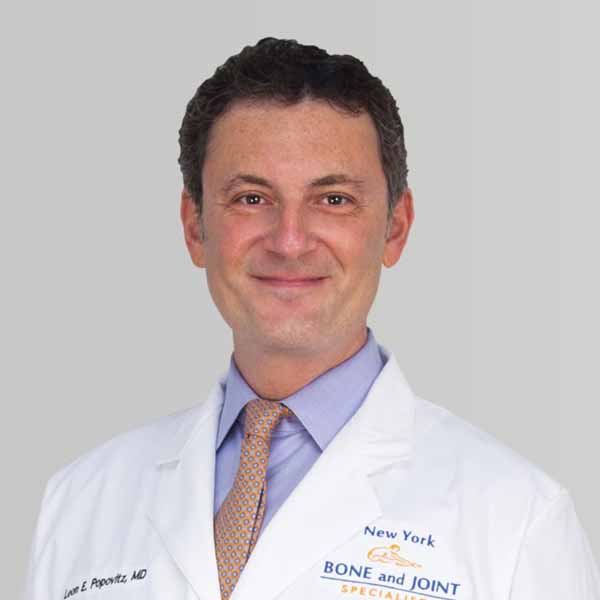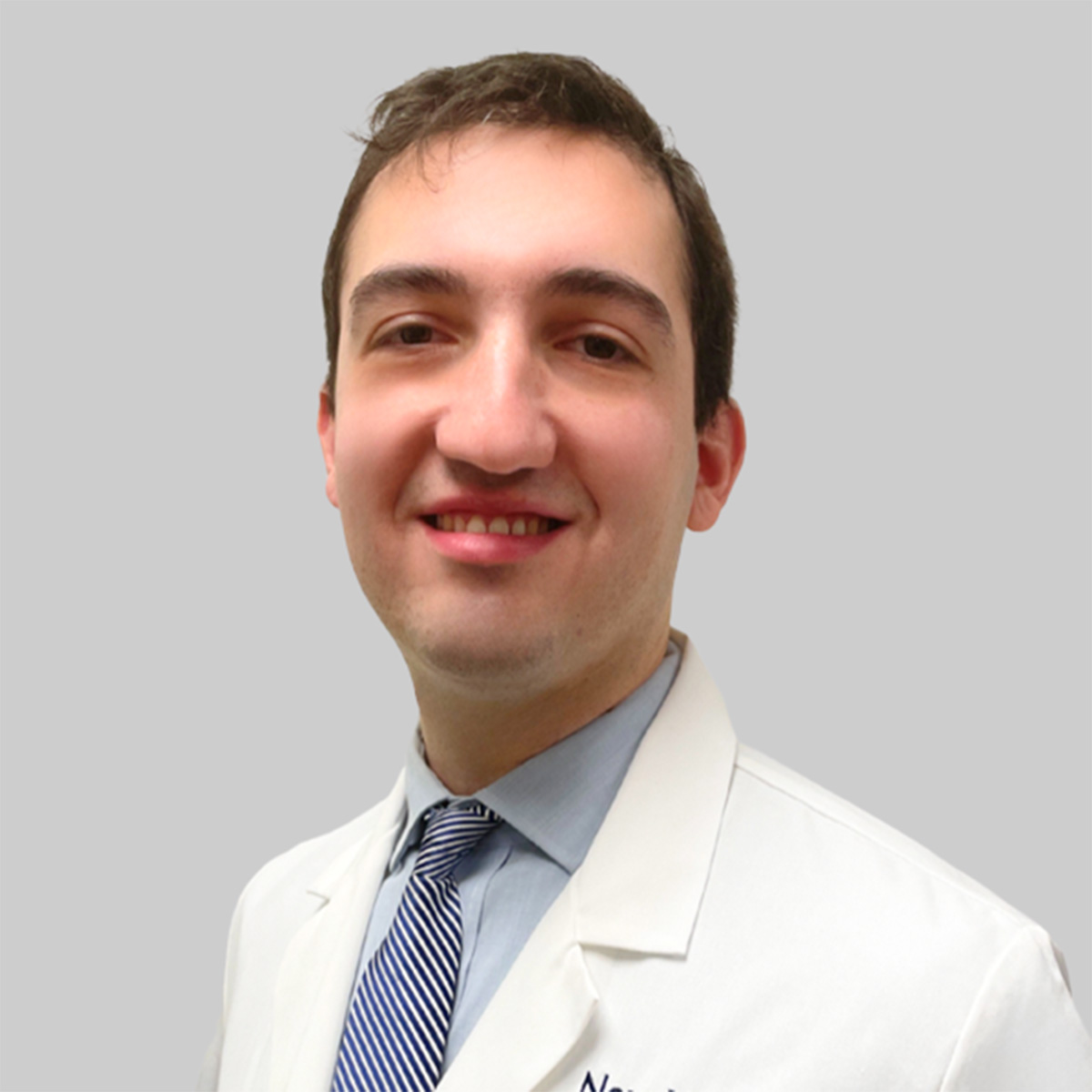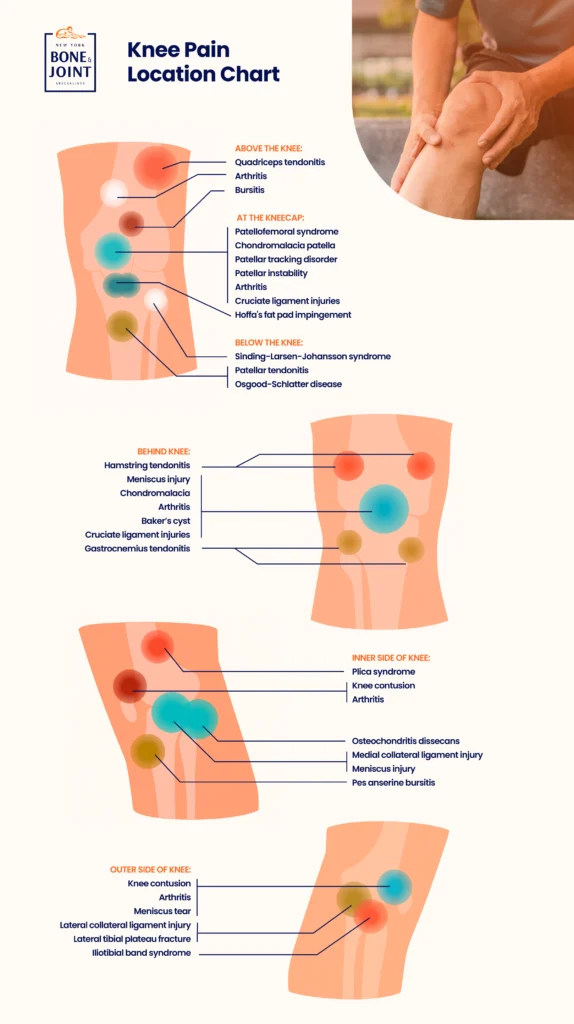When your knees aren’t working properly, everything becomes more difficult, from your morning routine to weekend activities you love.
That’s where our team of dedicated knee doctors and knee specialists comes in, bringing years of specialized experience to help New York patients reclaim their mobility and comfort.
Our comprehensive approach means we don’t just treat symptoms – we dig deep to understand what’s really going on with your knee and why it’s causing you trouble.
We believe in giving you options. Many of our patients find relief through targeted physical therapy, innovative injection treatments, or other non-invasive methods.
For those who need more advanced care, our knee doctor’s surgical expertise ensures you have access to the latest techniques and technologies when conservative treatment isn’t enough.
Your knee pain has kept you on the sidelines long enough. Let’s work together to figure out what’s wrong and create a plan that gets you back to living without limits.
What are the causes of knee pain?
Knee pain can have many causes, ranging from acute injuries to chronic conditions. Here are the most common reasons patients visit our clinic:
Acute Injuries
Acute injuries are damage caused to the parts of the knee, like bones or ligaments.
Ligament tears (ACL, MCL, PCL, LCL) often occur during sports or sudden directional changes. Meanwhile, Meniscus tears can happen from twisting motions or direct impact.
Fractures around the knee joint, patellar dislocation, and muscle strains are also common injury-related causes.
Overuse and Repetitive Stress
Overuse of the knee joint, usually seen with athletes, can cause inflammation and pain in the back of the knee and the kneecap. Runner’s knee (patellofemoral pain syndrome) develops from repetitive stress on the kneecap.
Meanwhile, Iliotibial band syndrome causes pain along the outer knee, while patellar tendinitis affects the tendon connecting the kneecap to the shinbone.
A condition called Bursitis occurs when the fluid-filled sacs around the joint become inflamed.
Degenerative Conditions
Osteoarthritis is the most common cause of degenerative knee pain, resulting from cartilage breakdown over time. Age-related Rheumatoid arthritis and other inflammatory conditions can also affect the knee joint.
Other degenerative conditions, like Chondromalacia patella, involve softening of the cartilage under the kneecap.
Mechanical Issues
Mechanical issues are problems with mobility and movement, usually as a result of bone or muscle growths. Loose bodies (fragments of bone or cartilage) can cause pain and catching sensations.
Baker’s cysts, hard lumps that develop behind the knee, can cause swelling and stiffness. Elsewhere, muscle imbalances or poor biomechanics can lead to abnormal stress on knee structures.
Other Factors
Age-related wear and tear, obesity (which increases joint stress), previous injuries that didn’t heal properly, and certain occupations requiring repetitive kneeling or squatting can all contribute to knee pain. Sometimes pain in the knee can even originate from hip or back problems.
What’s causing your pain? Determining the precise cause requires evaluation by a qualified specialist. This hip pain location diagram can serve as an initial guide.
Inside Knee Pain
Inside knee pain is usually caused by injuries to the medial collateral ligament (MCL) or medial meniscus from twisting or direct impact. Arthritis and inflamed bursae near the inner knee are also common causes.
Pain in the Back of the Knee
Back of knee pain often comes from Baker’s cysts (fluid-filled sacs) or hamstring strains. Rarely, blood clots can cause pain behind the knee.
Outside Knee Pain
Outside knee pain is commonly caused by IT band syndrome, especially in runners and cyclists. Injuries to the lateral ligaments or meniscus can also cause outer knee pain.
What are the symptoms of knee pain?
The symptoms of knee pain can vary depending on the cause of your problem. An experienced knee pain doctor can work with you to determine the issue and put together a recovery plan that addresses both the short-term pain and long-term prevention.
Some common symptoms that appear with most knee conditions include:
Swelling and Inflammation
Many knee conditions cause visible swelling around the joint, making the knee appear larger than normal. This swelling may be accompanied by warmth and redness, particularly in cases of infection or inflammatory arthritis. You may also feel some stiffness, tightness, and have difficulty moving.
Stiffness and Limited Mobility
Morning stiffness is common, especially with arthritis, and usually loosens throughout the day. Some patients find their knee “locks up” or gets stuck in certain positions. This stiffness may make everyday activities, like walking or climbing stairs, difficult.
Mechanical Symptoms
A grinding or rubbing sensation when moving the knee often indicates cartilage problems. Some people hear or feel clicking, popping, or catching sounds during movement.
This can be a sign of ligament damage and can cause the knee to give way if not addressed quickly.
Functional Limitations
Walking, climbing stairs, or getting up from seated positions may become painful or difficult. Many patients notice increased pain with weight-bearing activities or after periods of rest. You may also find that your sleep can be disrupted when pain worsens at night or when changing positions in bed.
Muscle Weakness
Muscle weakness in the surrounding thigh muscles often develops as people compensate for knee pain. In cases of inflammation in the muscle, you may even feel tired, nauseous, or have a general feeling of sickness.
How do our knee doctors treat knee pain?
Our orthopedic knee doctors collaborate closely with you during your recovery journey, emphasizing non-surgical approaches to facilitate the body’s natural healing. Surgical intervention is considered only for the most severe conditions.
Non-Surgical Treatment Options:
- Rest and Activity Modification: Involves avoiding activities that aggravate pain while encouraging gentle movement to prevent stiffness.
- Physical Therapy: Focuses on strengthening your knee muscles, stretching tight areas, and enhancing flexibility and range of motion.
- Medications: Includes over-the-counter pain relievers (ibuprofen or acetaminophen) and prescription anti-inflammatory drugs for more pronounced pain.
- Ice and Heat Therapy: Application of ice is recommended for acute injuries and inflammation, while heat is beneficial for muscle stiffness and chronic pain.
- Weight Management: Reducing excess body weight helps alleviate pressure on the joints.
- Assistive Devices: Utilizing canes, walkers, or shoe inserts can improve mobility and decrease stress on the joints.
Injection Therapies:
Corticosteroid injections, expertly administered by our NYC knee specialists, can offer temporary relief for conditions such as ACL and MCL tears, with effects that can last for several months.
Surgical Interventions:
When non-operative treatments are ineffective, surgical options may be necessary. Many of our team are experienced surgeons and are ready to perform treatments if required. We only suggest surgical intervention in the most severe cases.
What conditions do our knee doctors treat?
Our expert team of orthopedic knee doctors and knee specialists can treat a range of conditions, including:
- ACL Reconstruction
- ACL Tear
- Arthroscopic Knee Surgery
- Chondromalacia Patella (Patellofemoral Syndrome)
- Iliotibial Band Syndrome
- Knee Arthritis/Osteoarthritis
- Knee Arthroscopy – Arthroscopic Surgery
- Knee Cartilage Injury – Repair and Transplantation
- Knee Fracture
- Knee Ligament Injuries
- Loose Body in the Knee
- MCL Tear
- Meniscal Injuries
- Meniscal Tears
- Partial Knee Replacement
- Patellar Dislocation
- Patellar Tendinitis (Jumper’s Knee)
- Patellofemoral Pain
- Total Knee Replacement
- Unicondylar Knee Replacement
Why are we among NYC’s best orthopedic knee doctors?
For decades, New Yorkers have relied on our acclaimed knee doctors and surgeons. Here’s why we are among the best:
- Prioritizing Joint Health: We focus on the health and healing of your joints, vital for an active and long life.
- Comprehensive Care: Our world-class specialists provide expert and compassionate guidance for diverse knee conditions, from diagnosis to complete rehabilitation.
- Effective Non-Surgical Treatments: In over 90% of cases, our orthopedic treatments successfully resolve knee issues without surgery.
- Commitment to Full Recovery: We are dedicated to complete patient recovery through conservative approaches and expert surgical intervention when required.
Read our Patient Reviews below.
Our best-rated orthopedic knee specialists in NYC
Our knee doctor team is led by New York Bone & Joint co-founder Dr. Leon E. Popovitz, MD, the internationally renowned knee surgeon and orthopedic specialist. Among his many honors, he has been listed as one of the best orthopedic surgeons in the city by New York Magazine and is on the New York Times’ “Superdoctors” list.
Our expert doctors possess decades of experience in treating knee problems, mobility issues, and injuries. More information about our team of experts can be found above.













